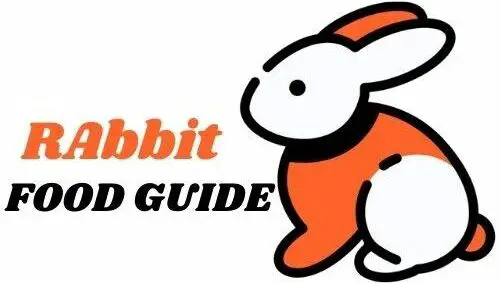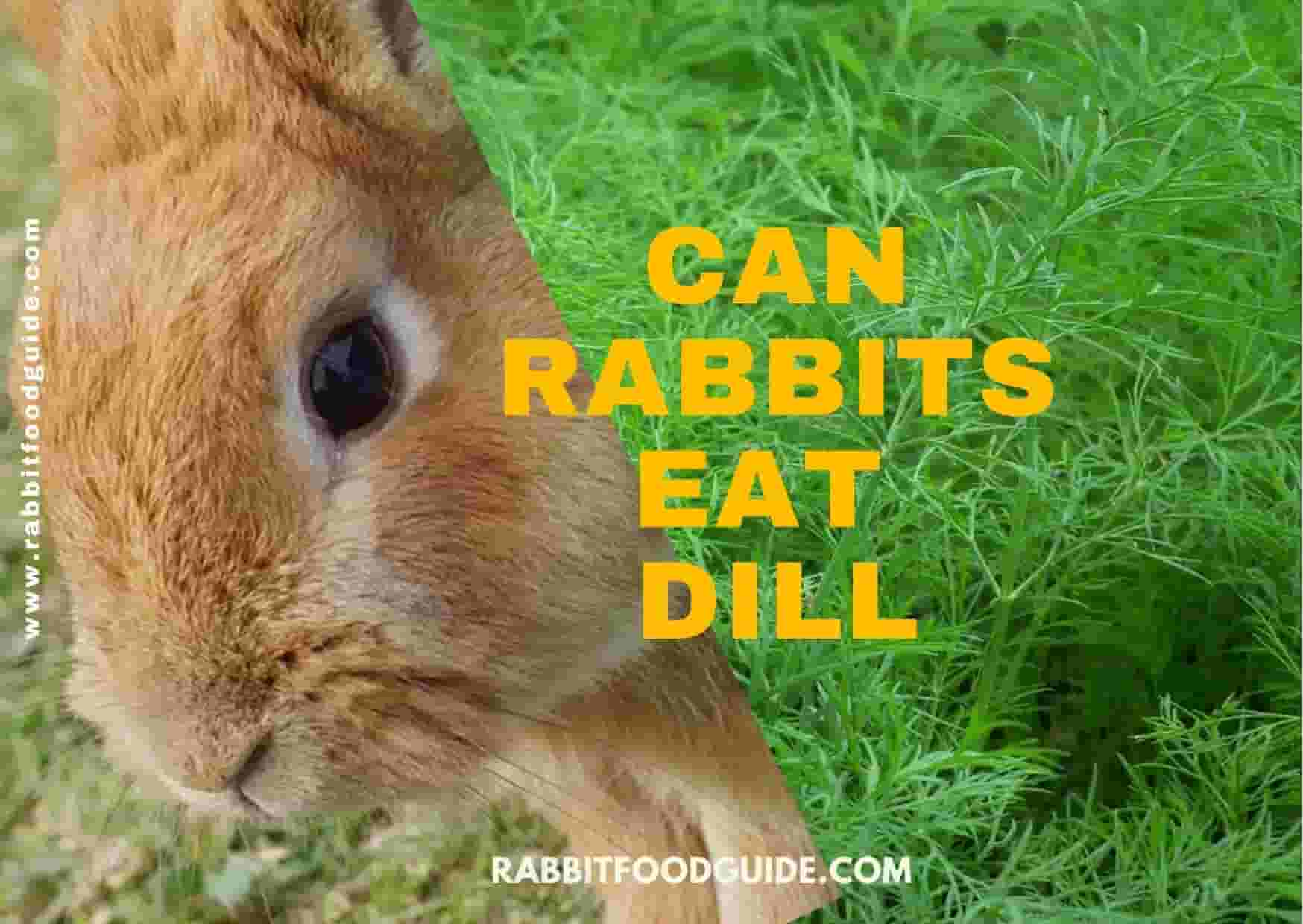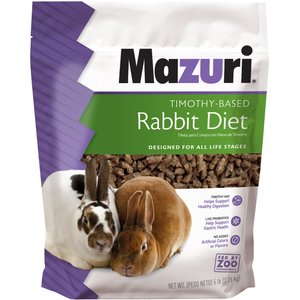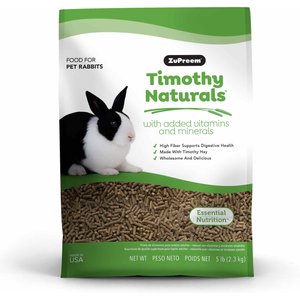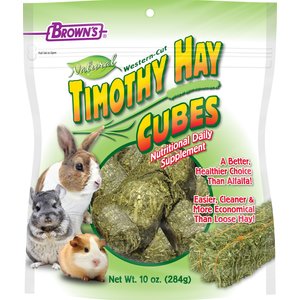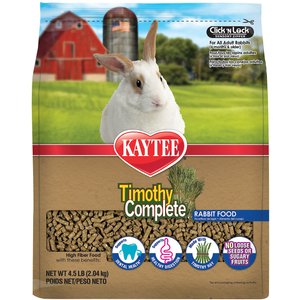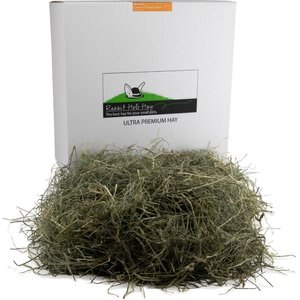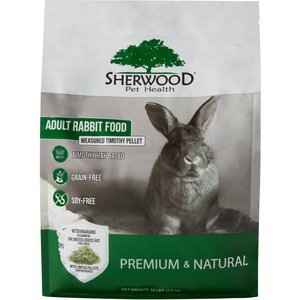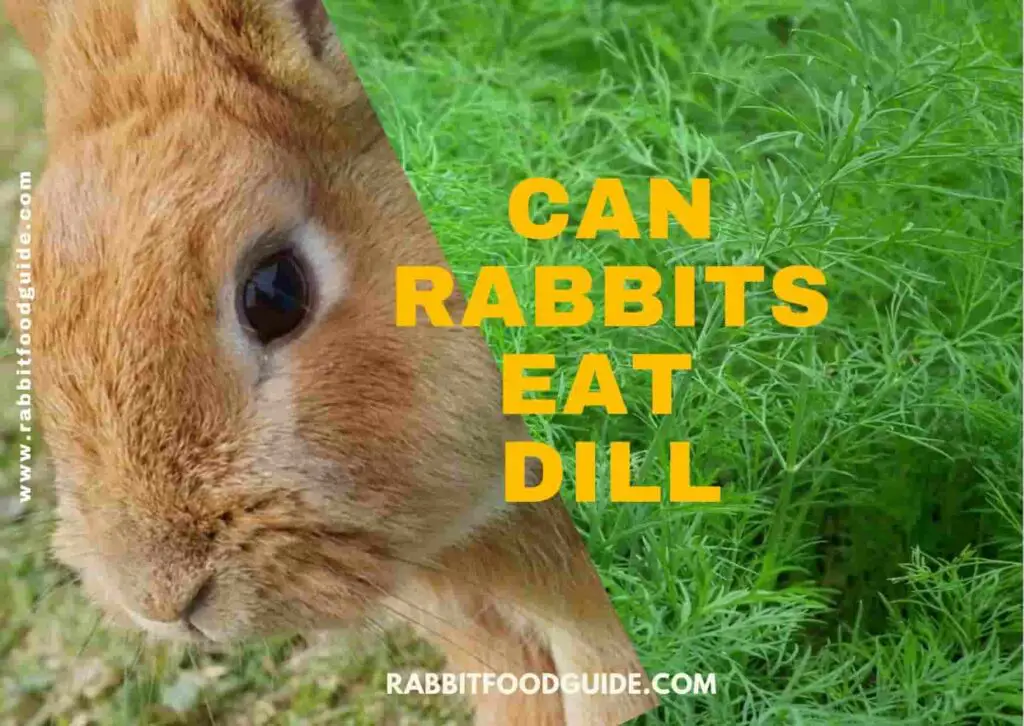
Table of Contents
Can Rabbits Eat Dill?
Can rabbits eat dill? YES, Dill is a good nutritious leafy green for rabbits. Same as mint, basil, sage, thyme, etc. Dill is one of the safest herbs we can feed rabbits. There are many herbs that are dangerous to animals like rabbits. As a rabbit lover, you will always want to know whether Dill is safer to serve rabbits. Dill does not contain any toxic chemical for rabbits and Dill is rich in essential nutrition for rabbits, and rabbits like the crunchy taste. But we must limit the amount of Dill. Always feed a small amount of Dill & keep the moderation. It’s totally safe to provide a small portion of Dill to your rabbits if they like those.
Rabbits are herbivores. But we can’t provide a full diet with herbs, vegetables, and fruits. Rabbits’ major food source must be fresh quality hay and grass. They take almost all the nutrition from hay supplies. We can serve a small number of leafy green herbs in their daily diet as other nutritious foods. Dill can provide extra nutrition to your rabbits as a part of a balanced diet. Dill can provide many health benefits to rabbits and also there is a potential health risk to rabbits if we overfeed them. This article covers all the health benefits, nutrition facts, overfeeding health issues & many more things that you should know before feeding Dill to your rabbits.
Let’s start without any delay!!!
Video Credit For Brushes and Bunnies YouTube Channel
Extra Information About Dill
Dill is a plant that is related to the Umbelliferae family. Dill seeds and leaves are commonly used in cooking as aromatic herbs. This plant only grows to two to three feet in height. Dill leaves are yellow-green feathery type. Dill is available year-round. In the United States, Dill is used as a popular flavor for dill pickles. These Dill have licorice flavor and tastes sweet and mild.
Dill is packed with flavonoids, and that has helped to reduce the risk of heart disease and stroke. But that’s not the only reason dill is thought to improve heart health. Research on animals shows that dill can also reduce LDL cholesterol levels.
WEBMD.com
Dill has many health benefits. Dill in early-stage or war dill is used to apply in wounds for healing. Dill helps with diabetes and it can improve heart health. Dill has the properties of anticancer, help to reduce blood sugar level, improve bone health, and many more. Dill is a good natural herb for both humans and animals.
According to the US Department of Agriculture(USDA), 100g of Dill contain these nutrients
| Energy | 180 kJ (43 kcal) |
| Carbohydrates | 7 g |
| Dietary fiber | 2.1 g |
| Fat | 1.1 g |
| Protein | 3.5 g |
Vitamins and Minerals
| Vitamin A | 7717 IU |
| Thiamine (B1) | 0.1 mg |
| Riboflavin (B2) | 0.3 mg |
| Vitamin C | 85 mg |
| Calcium | 208 mg |
| Iron | 6.6 mg |
| Magnesium | 55 mg |
| Manganese | 1.3 mg |
| Phosphorus | 66 mg |
| Potassium | 738 mg |
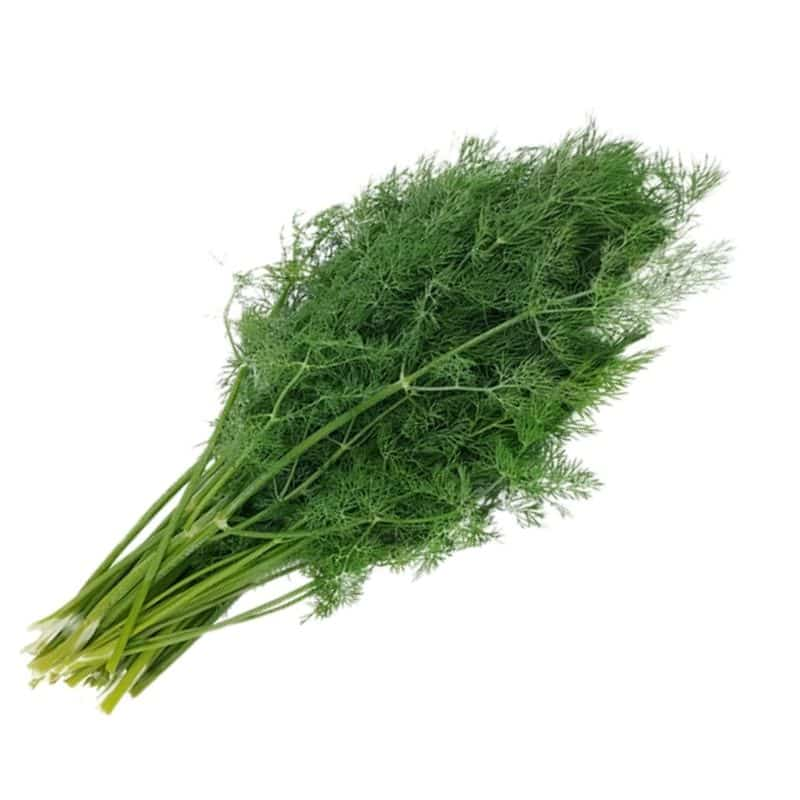
GET MORE INFORMATION ABOUT: RABBITS & COCONUTS
Do Rabbits Like To Eat Dill?
It can change from time to time. Most of the time rabbits like to eat Dill because of its sweetness and crunchiness taste. First, you can offer them few Dills to check whether they like it or not. If your rabbits don’t like to eat Dill it’s ok & it’s normal. Some rabbits don’t like the flavor of Dill.
Tip: When you introduce new food to rabbits, always give a small portion of it to the rabbit’s daily diet. Make Sure to introduce one new food type at a time. These things apply to any type of food. Rabbits’ health is in your hands.
Is Dill Safe For Rabbits?
Yes, Dill leafy part is safe for rabbits. It contains dietary fiber, vitamin C, vitamin K, vitamin A, copper, and magnesium, etc. They are low in calories and high in fiber. Dill is safe enough to serve rabbits occasionally. As you can see in the nutrition chart, dill contains a considerable amount of high calcium, sugar, and phosphorus. Because of that don’t try to overfeed them with dill. It can lead to many health issues. Avoid feeding Dill seeds to rabbits. Except that dill is a good dietary supplement for rabbits.
We can provide leafy greens up to 10 % of the rabbit’s diet and always keep the moderation. If we serve the right amount of Dill, it will never harm your rabbit’s health.
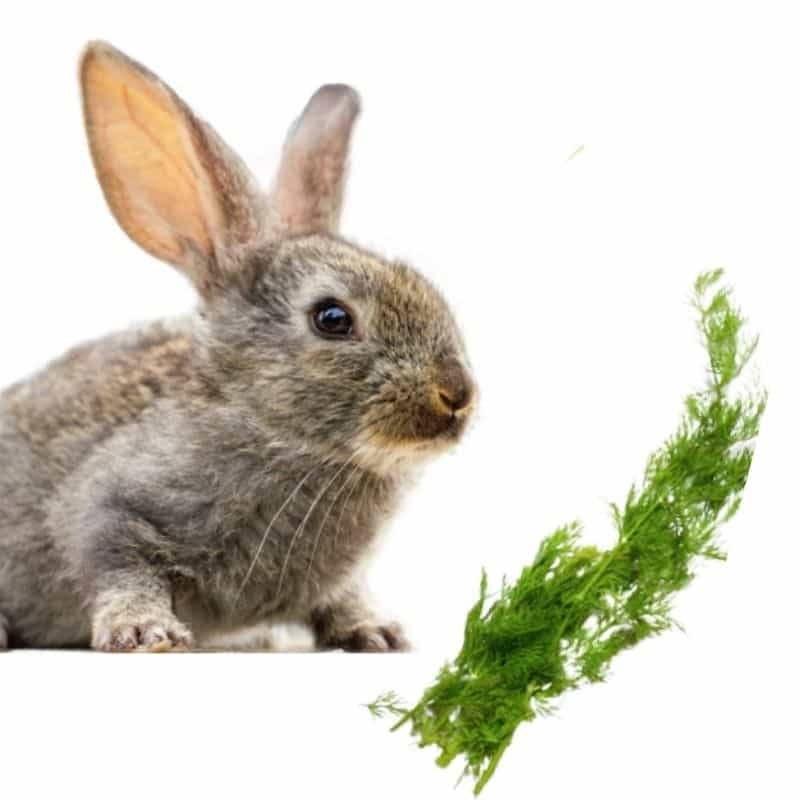
Benefits Of Dill For Rabbits
Dill has many essential nutrients and health benefits for rabbits. It contains, dietary fibers, proteins, vitamins B6, K, and E, magnesium, potassium, iron, manganese, calcium, etc. Dill can add extra fiber amount to your rabbit’s diet. Because of the high dietary fiber, it avoids gastrointestinal problems such as diarrhea, gases, and bloating.
Vitamin C helps muscle development in rabbits & it helps to maintain a healthy blood system. Vitamin C acts as an antioxidant that helps the bones, skin, and connective tissues. Vitamin C is essential for rabbits, as lack of vitamin C can cause scurvy disease. This is a common illness among rabbits.
Dill is a fine source of Vitamin K. It will help to maintain healthy bones. It increases the efficiency of the immune systems in rabbits. Dill provides vitamin E. Vitamin E also acts as an antioxidant in the rabbit’s body.
Fiber helps to increase the efficiency of the digestive systems in rabbits. Vitamin A improves your pet’s vision and develops bones. Dill is a good supplier of beta-carotene that helps to prevent age-related blindness.
Dill is rich in potassium and magnesium. According to researches, these nutrients can reduce the risk of death from heart diseases. Potassium can protect from muscle mass loss and reduce the risk of developing kidney stones.
How Often Should We Feed Dill?
Dill is a good leafy herb for your rabbit only if we feed them according to a proper guide. A small amount of Dill can provide good health benefits for them. Overfeeding can cause bloating, increase gas inside your pet, and too much calcium, phosphorus levels can be harmful to your rabbit’s health.
Always provide Dill in moderation. It’s better if you can provide Dill mixing with other leafy greens and vegetables. You can provide 1 cup of mixed vegetables for a rabbit of a 2-pound weight. You can add Dill to your rabbit’s diet a few times per week.
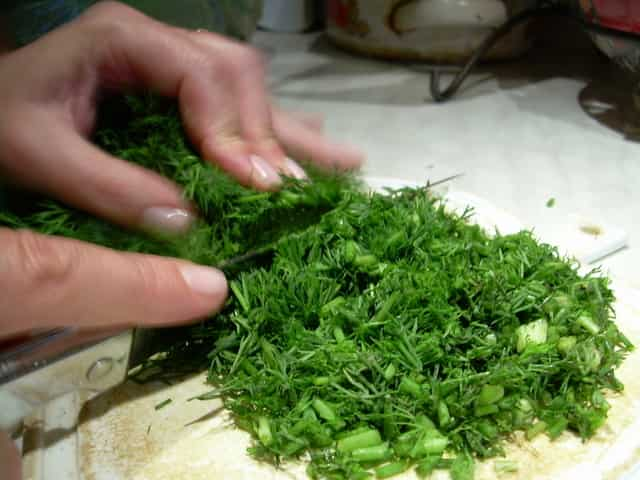
Proper Way To Introduce Dill For Rabbits
As we know now, Dill is a good, natural herb for rabbits. Mix Dill with other vegetables to get the maximum nutrients on a daily basis. But there is a guide you must follow before feeding Dill and Let us check it out.
- If you buy Dill from the market, wash it carefully and gently remove waxes and pesticides.
- Remove the Dill seeds. They can be stuck in your rabbit’s throat and they are unhealthy for rabbits.
Before introducing Dill to the rabbits for the first time, you need to start up with small portions. Keep inspecting them carefully. If they show some illness, stop feeding Dill and only feed the rabbit’s daily diet (Diarrhea, lethargy, constipation, and loss of appetite are some of the illnesses)
Don’t try to introduce many kinds of food at the same time & try to give the same food until they are fully adapted to eat. Keep in mind to introduce a small portion of the new food with other regular foods (daily diet). Follow up the rules for better rabbit health.
Don’t try to overfeed them. Do not feed Dill for baby rabbits less than 12 weeks of age.
Always provide occasionally a small amount of Dill as a part of your rabbit’s daily diet. Moderation is the key to rabbits’ health.
Can Rabbits Eat Dill Seeds?
Don’t try to feed Dill seeds for rabbits. Only feed them with Dill green part. Remove Dill seeds before feeding Rabbits. They can get stuck in your rabbit’s throat and they are unhealthy for rabbits. Dill seeds are high in carbs and fat and low in fiber. Feeding those to rabbits can always lead to obesity risk. It’s better to avoid feeding seeds to rabbits.
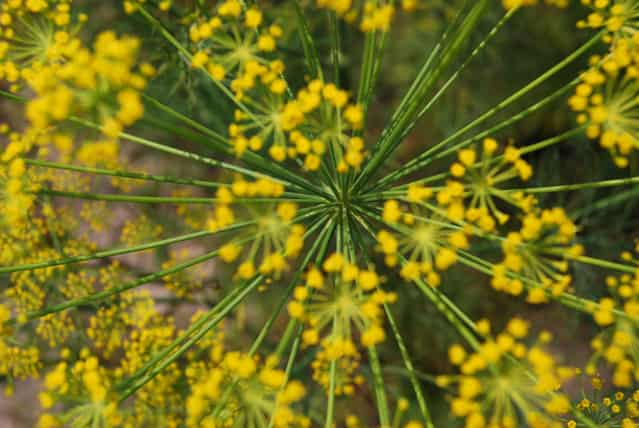
Other Good Foods You Can Provide To Rabbits
Rabbit’s diet should mainly be covered with quality hay and grass. In addition, we can provide a small portion of vegetables and fruits. We recommend giving two cups of fresh vegetables to adult rabbits daily.
- Bell peppers
- Bok choy
- Brussels sprouts
- Basil
- Cilantro
- Endive
- Green leaf
- Red leaf
- Parsley
- Fennel
Fresh fruits should be served one or two times per week as a treat.
- Grapes
- Banna
- Berries
- Melon
- Peach
- Pear
- Plum
- Watermelon
- Papaya
- Pineapple
- Orange
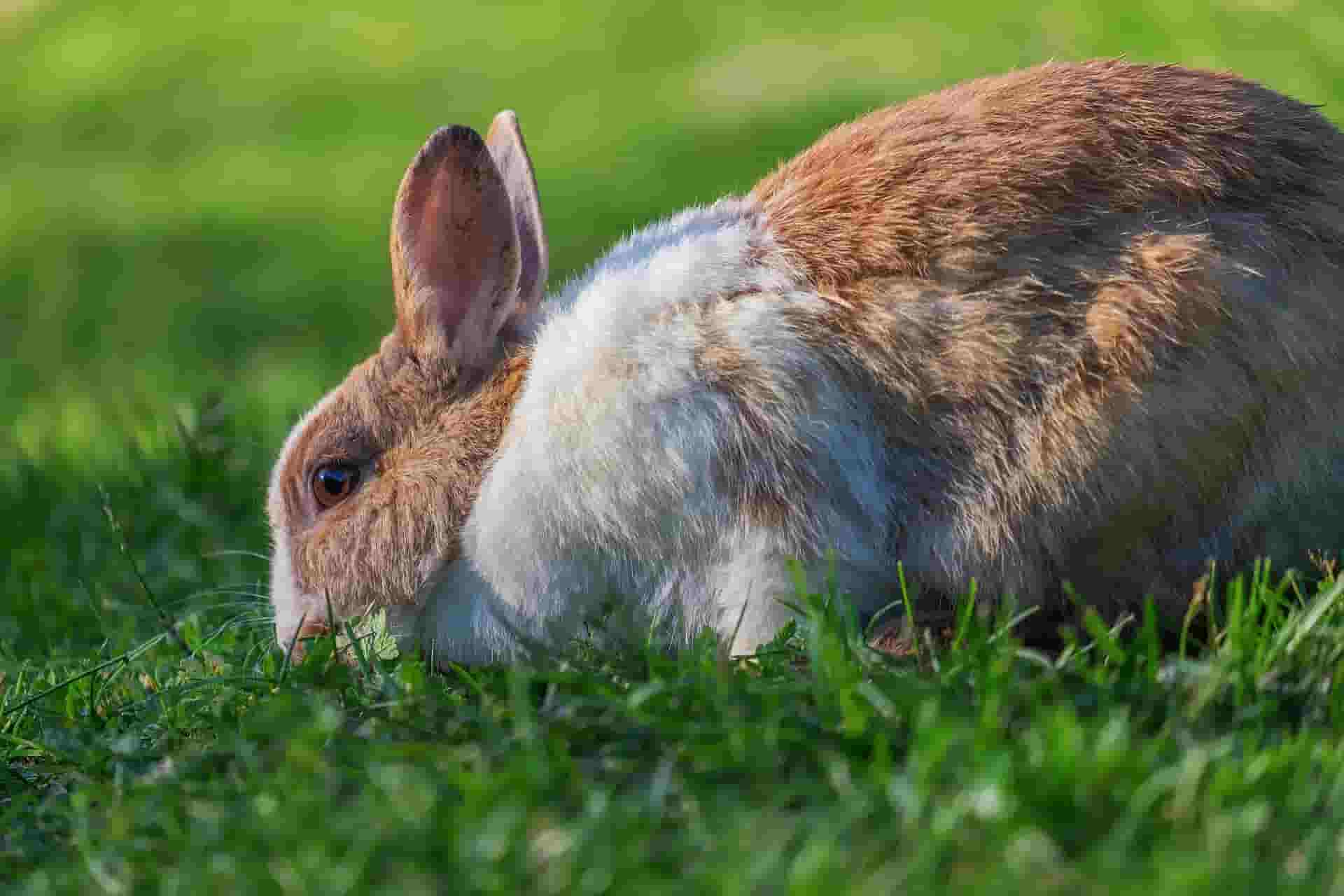
Summery
We know now, that Dill is a good leafy herb source for rabbits, but always serve them with only a limited amount. Dill is basically low in calories and loaded with many other good nutrients. Some of them are dietary fibers, proteins, vitamins B6, K, and E, magnesium, potassium, iron, manganese, calcium, etc.
Always provide Dill in moderation. Dill contains a considerable amount of high calcium, sugar, and phosphorus. Because of that don’t try to overfeed them with dill. It can lead to many health issues. Avoid feeding Dill seeds to rabbits. It’s better if you can provide Dill mixed with other leafy greens and vegetables. You can provide 1 cup of mixed vegetables for a rabbit of 2 pounds body weight. You can add Dill to your rabbit’s diet a few times per week. I think I have covered all the information on Dill that you need to know before feeding your rabbits.
Thank you!!!
